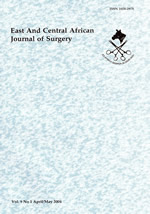
|
East and Central African Journal of Surgery
Association of Surgeons of East Africa and College of Surgeons of East Central and Southern Africa
ISSN: 1024-297X
EISSN: 1024-297X
Vol. 16, No. 2, 2011, pp. 62-71
|
 Bioline Code: js11031
Bioline Code: js11031
Full paper language: English
Document type: Research Article
Document available free of charge
|
|
|
East and Central African Journal of Surgery, Vol. 16, No. 2, 2011, pp. 62-71
| en |
Peritoneal Drains in Perforated Appendicitis without Peritonitis: A Prospective Randomized Controlled Study.
Jani, P.G. & Nyaga, P.N.
Abstract
Background: Appendicitis is recognized worldwide as the commonest surgical emergency. Its management becomes more challenging when the patient presents with perforated appendicitis In the western world To determine the value of peritoneal drains in patients operated with an appendicular pathology more advanced then simple acute appendicitis (referred as advanced appendicular pathology). Patients with generalized peritonitis secondary to an appendicular pathology were excluded.
Methods: This was a randomized prospective study of acute appendicitis patients seen at the Accident and Emergency Department or in the surgical wards at Kenyatta National Hospital (KNH) over 12 months period.
Results: Of the 216 patients diagnosed with acute appendicitis, 117 patients had simple acute appendicitis without perforation and were therefore excluded from the study. Ninety seven patients had various stages of advanced appendicular pathology. Seven had generalized peritonitis and were also excluded. The remaining 90 patients constituted our study population. These were equally randomized to two groups. Forty five had the closed system of tube drainage provided (without suction) while the remaining 45 had no drain inserted. All of the 90 patients included in the study had histological confirmation of an inflamed perforated appendix. Postoperatively, 18 patients had wound sepsis and 6 patients had other complications including faecal fistula, abdominal abscess, and paralytic ileus. Out of those with wound sepsis, the majority (83%) were in the drain group. All patients with other complications belonged to the drain group. The patients in the drain group had significantly longer duration of antibiotic use and hospital stay.
Conclusion: The findings in this study showed an increased complications rate, prolonged use of antibiotics and hospital stay in patients with drains operated for an advanced appendicular pathology.
|
| |
© Copyright 2011 - East and Central African Journal of Surgery
|
|
